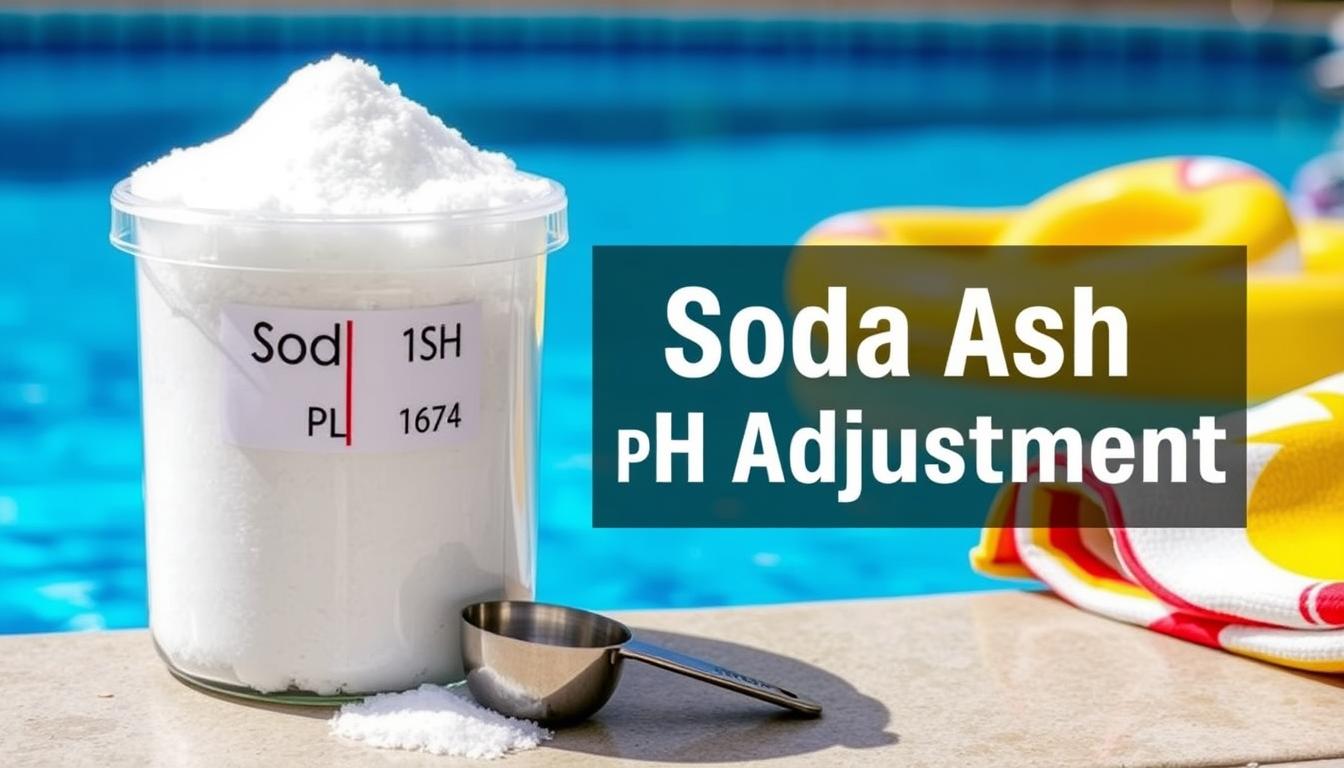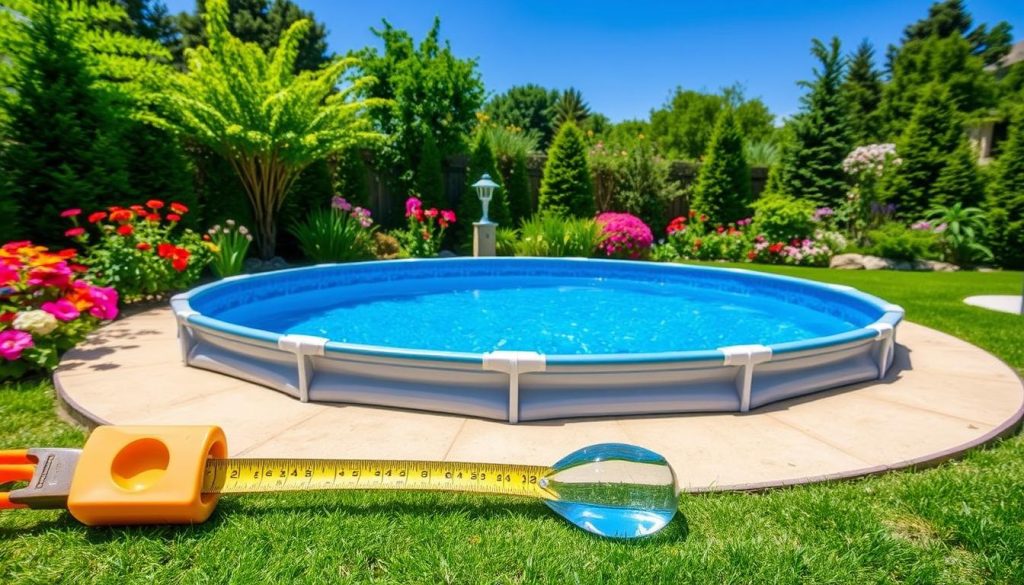
Summer’s coming, and we’re all excited about pool time. But before jumping in, we need to check the pool’s pH balance. Unbalanced pH can cause problems for swimmers and pool equipment. Soda ash is a great solution for pool pH adjustment.
This guide covers using soda ash for alkaline pool treatment. You’ll learn how to figure out the right soda ash dosage for pools. We’ll also teach you about pool chemical calculations.
By the end, you’ll know how to keep your pool balanced all summer. Let’s dive into the world of soda ash and pool care!
Understanding the Role of pH in Pool Water Balance
Proper pool water balance is crucial for safe swimming. The pH level is a key factor in this balance. The pH scale goes from 0 to 14, with 7 being neutral.
Values below 7 are acidic, while those above 7 are basic or alkaline. Maintaining the right pH ensures a pleasant swimming experience.
Ideal pH Range for Swimming Pools
The ideal pH range for pools is 7.2 to 7.8. This range keeps swimmers comfortable and protects equipment. It also helps sanitizers work effectively.
Proper pH levels reduce skin and eye irritation. They also prevent corrosion of pool surfaces and equipment.
Effects of Low and High pH Levels
Low pH, or acidic water, can cause problems in pools. These issues include:
- Skin and eye irritation for swimmers
- Corrosion of metal components, such as ladders, liners, and pump parts
- Etching of plaster surfaces
- Reduced effectiveness of chlorine as a sanitizer
High pH, or alkaline water, can lead to other problems. These include:
- Scaling on pool surfaces and equipment
- Cloudy water
- Decreased sanitizer efficiency
- Skin and eye irritation due to the formation of chloramines
Relationship Between pH and Total Alkalinity
Total alkalinity (TA) helps stabilize pH levels in pool water. It acts as a buffer against rapid pH changes. The recommended TA range is 80 to 120 ppm (parts per million).
Maintaining the right balance between pH and total alkalinity is key to ensuring a safe and enjoyable swimming environment while protecting pool surfaces and equipment from damage.
| Parameter | Ideal Range | Effects of Imbalance |
|---|---|---|
| pH | 7.2 – 7.8 | Skin/eye irritation, corrosion, scaling |
| Total Alkalinity | 80 – 120 ppm | Rapid pH fluctuations, difficulty adjusting pH |
| Calcium Hardness | 200 – 400 ppm | Scaling, plaster damage |
| Free Chlorine | 1 – 3 ppm | Inadequate sanitization, unsafe swimming conditions |
Regular testing of pool water chemistry is essential. This includes checking pH and total alkalinity. Pool owners should test their water weekly.
Make necessary adjustments to keep pH and TA levels within recommended ranges. This ensures a well-balanced and safe swimming pool.
Calculating the Amount of Soda Ash Needed
Keeping pool water balanced is crucial for safe swimming. We need to maintain the right pH level. Soda ash helps raise low pH levels to the ideal range of 7.4 to 7.8.
Let’s explore how much soda ash we need. We’ll break it down step by step.
Determining Your Pool’s Volume
First, we need to know our pool’s volume. The calculation depends on the pool’s shape.
- For a rectangular pool, multiply the length, width, and average depth, then multiply the result by 7.5.
- For a round pool, multiply the diameter by itself, then by the average depth, and finally by 5.9.

Testing Current pH Levels
Test the pool water’s current pH level before adding soda ash. Use test strips or a pH testing kit for accuracy. The ideal pH range is between 7.2 and 8.0.
The optimal range is 7.4 to 7.6. If our pH is below 7.2, it’s time to add soda ash.
Using a Soda Ash Dosage Calculator
Generally, we need six ounces of soda ash per 10,000 gallons of water. This raises the pH by 0.2 points. For precise dosing, use a soda ash calculator or check manufacturer recommendations.
Remember, adding too much soda ash can cause the pH to spike, leading to other water balance issues. It’s better to start with a smaller amount and retest the water after a few hours to see if more is needed.
Here’s a helpful table for determining soda ash amounts. It’s based on pool volume and desired pH increase:
| Pool Volume (gallons) | pH Increase of 0.2 | pH Increase of 0.4 | pH Increase of 0.6 |
|---|---|---|---|
| 5,000 | 3 oz (85 g) | 6 oz (170 g) | 9 oz (255 g) |
| 10,000 | 6 oz (170 g) | 12 oz (340 g) | 18 oz (510 g) |
| 20,000 | 12 oz (340 g) | 24 oz (680 g) | 36 oz (1.02 kg) |
| 30,000 | 18 oz (510 g) | 36 oz (1.02 kg) | 54 oz (1.53 kg) |
These steps help us raise our pool’s pH level correctly. Using a soda ash calculator ensures accuracy. This way, we create a safe and fun swimming environment.
How Much Soda Ash to Raise pH in Pool
A healthy pool needs the right pH balance. Soda ash can fix low pH levels. Let’s explore how to add soda ash to your pool safely and effectively.
Step-by-Step Guide to Adding Soda Ash
First, test your pool water’s pH level. For every 10,000 gallons, use half a pound of soda ash. This raises pH by 0.2.
Mix the soda ash with water in a bucket. Run your pool filter and pour the solution around the pool’s edge. After 1-2 hours, retest the pH.
Don’t add more than 1 pound per 10,000 gallons at once. This prevents cloudy water. Make more adjustments if needed.
Precautions and Safety Measures
Safety comes first when handling soda ash. Wear gloves and eye protection to avoid irritation. Store it in a dry, secure place away from kids and pets.
If you’re unsure, ask a professional pool service for help. Following these steps will keep your pool safe and comfortable for swimming.
This guide helps you add soda ash to raise pool pH. It focuses on safety and proper pH adjustment for a healthy pool.







